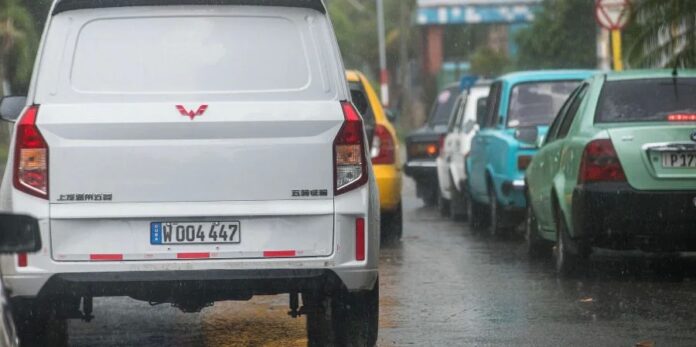MIAMI, United States – During a press conference on Monday, Cuba’s Minister of Transportation, Eduardo Rodríguez Dávila, announced the approval of a new policy for the sale, importation, and transfer of ownership of motor vehicles.
This legal framework is outlined in Gaceta Oficial (ordinary) No. 128 and will take effect on Wednesday, January 1, 2025. The regulations, which include a decree-law, a decree, ten resolutions from various agencies, and four additional internal resolutions, follow months of anticipation. According to the minister, the goal is to “leverage and maximize every available opportunity to improve the mobility of passengers and cargo.”
Rodríguez Dávila explained that “this policy will allow procedures to be simplified and made more flexible in line with the current situation, while also eliminating or countering the causes and conditions of irregularities arising in these processes.” However, he emphasized that the new rules “do not in themselves solve Cuba’s transportation problem, nor will they immediately allow every Cuban to buy a car with their salary,” as improving the country’s economic conditions is also necessary.
On his Facebook profile, the minister highlighted some key aspects of the new policy:
- The price of vehicles sold in freely convertible currency will not vary depending on whether the buyer is a legal entity or an individual. For individuals, prices will be lower than current levels.
- The transfer of ownership between individuals and legal entities is authorized, except for state-owned or state-participated entities and diplomatic entities, which are governed by specific independent regulations.
- Vehicles available on the Cuban market, including those retired from rental fleets but in good operating condition, will be allocated in Cuban pesos (CUP) for state and social priorities outlined in the economic plan, insurance replacements, taxis, and as incentives for individuals in various sectors.
- A special sales tax will be applied to vehicles, ranging from 35% of the total sale value in convertible currency for high-end vehicles to no tax for electric vehicles assembled in Cuba.
- A progressive tax in convertible currency will apply based on the number of vehicles acquired by an individual or legal entity, starting with the third vehicle purchased. Exceptions include minibuses, buses, trucks, trailers, semi-trailers, passenger and cargo tricycles, specialized vans, and electric vehicles.
- A maximum of six vehicles can be purchased by an individual or legal entity within a five-year period, except for electric vehicles and their charging equipment, which are not subject to limits.
- The importation of mopeds and motorcycles with internal combustion engines up to 250 cc, or low-displacement hybrids, with or without a sidecar, is authorized. These can be imported as passenger luggage, unaccompanied cargo, or shipments.
- The importation of electric tricycles with a capacity greater than two passengers or with cargo capacity is authorized.
- The resale of entire vehicles in CUP is allowed for those retired from tourism rental fleets, even if they are in poor operational condition, provided they can be refurbished by interested buyers.
- Individuals on official missions abroad for at least two years, including diplomats, collaborators, and others, are permitted a one-time import of vehicles.
Additional Details
One of the core aspects of the new policy relates to vehicle and transportation imports. Previously, individuals could import electric mopeds or motorcycles, as well as light trailers or semi-trailers up to 750 kg, with tariffs paid in Cuban pesos. Under the new regulations, this option remains available, but the policy now includes the importation of mopeds and motorcycles with internal combustion engines or hybrids — either new or up to 10 years old — with engines of up to 250 cc, as well as electric or hybrid tricycles with cargo capacity or more than two seats. These items can be imported as “unaccompanied passenger luggage or shipments.” According to the minister, “in all cases, individuals may import one vehicle every five years, paying tariffs in convertible currency.”
Furthermore, protective helmets will be exempt from tariffs if imported alongside motorcycles. Commercial sellers are also encouraged to include helmets with motorcycle sales. However, trailers will still require the payment of tariffs in convertible currency.
Rodríguez Dávila also explained that state personnel on foreign missions, including diplomats, businesspeople, and collaborators, are allowed to import electric or combustion mopeds and motorcycles under the same conditions. Additionally, they are permitted a one-time direct importation of an economical or mid-range car, either new or up to 10 years old, provided they have completed at least two years of continuous service abroad. These vehicles will be subject to tariffs in convertible currency. Importers must provide certification from the entity they belong to and coordinate with the Cuban importer Transimport.
Before concluding his Monday press conference, Rodríguez Dávila acknowledged that the new measures “do not, by themselves, solve the chronic transportation deficit.” However, he expressed hope that they would “encourage the gradual modernization of Cuba’s vehicle fleet.”
Sigue nuestro canal de WhatsApp. Recibe la información de CubaNet en tu celular a través de Telegram.




